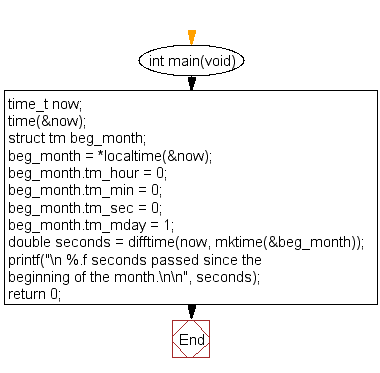C Exercises: Compute the number of seconds passed since the beginning of the month
2. Seconds Since Month Start
Write a program in C to compute the number of seconds passed since the beginning of the month.
Sample Solution:
C Code:
#include <stdio.h>
#include <time.h>
int main(void) {
time_t now; // Variable to hold the current time
time(&now); // Get the current time
struct tm beg_month; // Structure to hold the beginning of the month's date and time
beg_month = *localtime(&now); // Retrieve local time
beg_month.tm_hour = 0; // Set hours to 0
beg_month.tm_min = 0; // Set minutes to 0
beg_month.tm_sec = 0; // Set seconds to 0
beg_month.tm_mday = 1; // Set day to 1 (beginning of the month)
double seconds = difftime(now, mktime(&beg_month)); // Calculate the difference between the current time and the beginning of the month
printf("\n %.f seconds passed since the beginning of the month.\n\n", seconds); // Print the seconds elapsed since the beginning of the month
return 0;
}
Output:
222084 seconds passed since the beginning of the month.
N.B.: The result may varry for your current system date and time.
Flowchart:

For more Practice: Solve these Related Problems:
- Write a C program to calculate and display the total number of seconds that have elapsed since the beginning of the current month.
- Write a C program to compute the seconds passed since the start of the month and also display what percentage of the month has elapsed.
- Write a C program to convert the seconds elapsed since the month’s start into days, hours, minutes, and seconds, and print the result.
- Write a C program to calculate the seconds passed since the beginning of the month in both local time and UTC, then compare the two.
Go to:
PREV : Current DateTime Print.
NEXT : time_t to Textual Representation.
C Programming Code Editor:
Have another way to solve this solution? Contribute your code (and comments) through Disqus.
What is the difficulty level of this exercise?
Test your Programming skills with w3resource's quiz.
